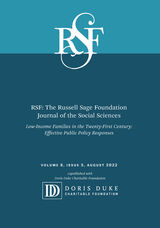RSF
The Russell Sage Foundation Journal of the Social Sciences: Low-Income Families in the Twenty-first Century: Effective Public Policy Responses
Marcy Carlson
Russell Sage Foundation, 2021
The twenty-first century has seen dramatic shifts in the nature of work, including a decrease in economic security and job opportunities for low-skilled workers. At the same time, the nature of families has also changed significantly, including a delay and decrease in marriage and the development of new types of complex family structures. These changes in work and family have contributed to a rise in inequality, with many lower-income families experiencing poverty and economic hardship as a result. Yet, public policy has not adapted to address these issues. In this issue of RSF, sociologists Marcia J. Carlson, and Christopher Wimer, developmental psychologist Ron Haskins, and an interdisciplinary group of contributors examine the growing needs of low-income families and explore both the extent to which public policy effectively serves them and how it can be improved.
The nine articles in this issue examine various aspects of contemporary work and family life for low-income families, the challenges they face, and whether current policies help to mitigate these challenges. Sigird Luhr and colleagues find that unpredictable work schedules were associated with increased difficulty arranging childcare, work-life conflict, and missed work for working mothers. Elizabeth O. Ananat and colleagues show that Emeryville, California's Fair Workweek Ordinance decreased working parents' schedule unpredictability, and improved their well-being without reducing worker hours. Pamela Joshi and colleagues find that less than a quarter of low-income, full-time working families earn enough to cover a basic family budget, compared to two-thirds of all full-time working families. Katherine M. Michelmore and Natasha V. Pilkauskas reveal that nearly 60% of children in lower-income families reside in households with a complex family structure that may result in difficulty filing for important tax credits like the Earned Income Tax Credit (EITC) that can help increase their incomes. Jennifer Randles shows that income and public aid are insufficient for many mothers to cover the cost of one of children’s basic needs - diapers - and suggests policies to help bridge this gap in the face of widespread economic insecurity.
This volume of RSF illuminates the many obstacles faced by lower-income families due to changes in the labor market and family patterns as well as the ways in which public policy can better respond to alleviate these obstacles.
[more]










